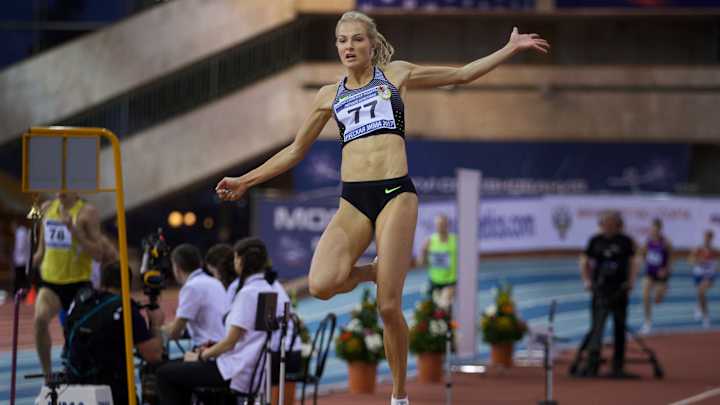Russia hopes for swift end to track and field doping exile

MOSCOW (AP) More than a year into Russia's exclusion from international track and field, high jump world champion Maria Kuchina feels like she's stagnating.
''I need emotion, I need competition, I need rivals,'' Kuchina said.
That's all missing because Russian track and field exists in limbo, banned since November 2015 as a series of investigations revealed widespread doping and alleged government officials helped to cover it up.
Sunday saw Russia's biggest meet of the year so far, though it featured only Russians, with very mixed quality in many events. Kuchina easily won her event in Moscow, but her result of 1.91 meters was far below her best.
However, after a string of false starts, Russia is inching closer to a return.
On Monday, track's world governing body, the IAAF, will hold a council meeting with the stated aim of drawing up a road map for Russia's return though, in some ways, the process has quietly begun.
Over the winter, the IAAF has been accepting applications from top Russian athletes who want to compete in international events as neutral athletes, rather than representatives of Russia's still-suspended track federation.
As of Wednesday, 33 Russians had applied, sending off forms listing their drug-test history under newly relaxed IAAF rules which no longer insist on Russian athletes training outside their home country. If the IAAF accepts all of them, Russia will have close to a full team at next month's European indoor championships in Serbia, just without a flag.
That's good news for Daria Klishina, the long jumper who was allowed to be Russia's only representative in track and field at last year's Rio Olympics because she has long trained in Florida, rather than in the Russian system.
''I don't want to be in that situation again, never,'' Klishina said Sunday, recalling how she found it tough to be on her own at the Olympics, where she finished ninth. If more Russians get permission to compete this season, ''I'll feel a lot better, because I didn't like competing alone with that huge responsibility.''
Competing as neutrals, not Russians, is a sensitive issue.
Many fans support the athletes who have submitted applications to the IAAF, though some Russian nationalists accuse them of betraying their country.
''There's more support because people who I know understand what sport means to me,'' Kuchina said. ''I try never to read online comments because they could destroy anyone's wellbeing.''
Middle-distance runner Elena Korobkina, however, said she'll refuse a place at major championships if it means competing as a neutral, though she will take part in other meets. ''Even if they let me, I won't compete at the Europeans because I want to race under my own flag,'' she said.
Even as Russia nears a return, there have been setbacks.
Documents released in December as part of a World Anti-Doping Agency inquiry showed eight unnamed Russians from the national track and field team had given suspicious samples ahead of the 2014 world indoor championships, but most were recorded as clean. The IAAF is looking into the issue.
In another blow, a German TV channel broadcast footage showing national-team runner Artyom Denmukhametov appearing to train with coach Vladimir Kazarin, who is suspended over alleged steroid use by several of his other athletes. Denmukhametov was in action at Sunday's meet, coming second in the 400m. He hasn't applied to the IAAF to compete as a neutral, according to Russian track federation records.
Until the IAAF either reinstates Russia or allows its top athletes to compete as individuals, Russian track will remain in suspended animation. Kuchina doesn't know if she'll be able to defend her world title in London in August.
''There's no information,'' she said, criticizing the lack of updates about her application. ''We're all waiting.''
